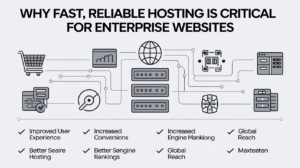Why Choosing the Right Hosting Platform Matters
For startups, the best hosting platforms for scaling startups can make or break your scalability plans. As your online presence grows, your hosting solution needs to accommodate:
- Increasing traffic
- Enhanced security requirements
- Robust performance expectations
without experiencing any downtime.
Hence, identifying a hosting provider that aligns with your startup’s goals is crucial for sustainable growth.
🏆 Key Criteria for Selecting the best hosting platforms for scaling startups
Scalability
Scalability is paramount for startups expecting rapid growth. Your hosting platform should easily accommodate traffic spikes without compromising performance. Look for providers offering:- Flexible resource allocation
- Easy upgrade paths
Performance and Speed
Page load speed and overall performance directly impact user experience and SEO rankings. Opt for hosting platforms with:- High-speed servers
- Content Delivery Networks (CDNs) to ensure efficient data delivery.
Security
Security breaches can be catastrophic for startups. Evaluate hosting providers offering:- SSL certificates
- Regular backups
- Malware scanning
- DDoS protection
Support 🤝
Reliable customer support is non-negotiable. Choose the best hosting platforms for scaling startups renowned for 24/7 accessible and knowledgeable support teams, ready to assist with any technical issues.Cost-Effectiveness 💰
Budget constraints are common for startups. Consider hosting providers that offer the best balance of price and performance, with:- Transparent pricing structures
- Scalable plans that evolve with your growth
🌟 Best Hosting Platforms for Scaling Startups in 2024
1. Amazon Web Services (AWS)
Overview: AWS remains a go-to choice for startups due to its vast service portfolio and scalability. Startups can leverage AWS’s cloud infrastructure to scale seamlessly and tap into advanced analytics, AI, and machine learning capabilities.
Key Features:
- Pay-as-you-go pricing model
- Extensive global server network
- Advanced security features
- Comprehensive support and documentation
Pros:
- Highly scalable and flexible
- Rich in resources for developers
- Strong performance and reliability
Cons:
- Complex for beginners
- Pricing can escalate with extensive resource use
2. Google Cloud Platform (GCP)
Overview: GCP offers a robust set of cloud-based solutions ideal for startups aiming for rapid expansion. It excels in data analytics and AI services, ensuring startups have the tools needed for accelerated growth.
Key Features:
- Custom VMs and Kubernetes
- World-class security measures
- Integrated AI and machine learning models
- Scalable and flexible infrastructure
Pros:
- Excellent integration with Google services
- Top-tier performance
- Strong data analytics capabilities
Cons:
- Complex pricing model
- Steep learning curve for new users
3. Microsoft Azure
Overview: Microsoft Azure stands out with its compatibility with Microsoft products and services. It’s a preferred choice for startups already utilizing Microsoft ecosystems like Office 365 or Windows Server.
Key Features:
- Wide range of hybrid cloud services
- Strong security protocols
- Comprehensive developer tools
- Seamless integration with Microsoft products
Pros:
- Powerful hybrid cloud capabilities
- Enterprise-level security
- Reliable performance
Cons:
- Can be expensive for high usage
- Initial setup complexity
4. DigitalOcean
Overview: DigitalOcean is ideal for startups looking for a straightforward yet powerful hosting solution. It’s known for its ease of use, developer-friendly tools, and cost-effective plans.
Key Features:
- Simplicity and ease of setup
- SSD-based virtual machines (Droplets)
- Competitive pricing
- Pre-configured one-click apps
Pros:
- User-friendly interface
- Affordable and transparent pricing
- Dedicated IPs and floating IPs
Cons:
- Limited global data centers compared to AWS, Google Cloud, and Azure
- May struggle with very high traffic spikes
5. Heroku
Overview: Heroku is a cloud platform service that allows startups to build, run, and operate applications entirely in the cloud. Its focus on simplicity and integration with the Salesforce ecosystem makes it a preferred choice for apps and services that evolve rapidly.
Key Features:
- Streamlined deployment and management
- Integrated with Salesforce
- Support for multiple programming languages
- Extensive add-on ecosystem
Pros:
- High ease of use
- Managed environment reduces manual server management
- Scalable and flexible
Cons:
- Not ideal for large-scale enterprise applications
- Costs can accumulate with scaling
🏅 Honorable Mentions
Vultr
Key Features:- Customizable virtual servers
- Competitive pricing
- Multiple global data centers
Linode
Key Features:- High-performance SSD Linux servers
- Strong customer service
- Transparent and affordable pricing
🤔 How to Decide Which Hosting Platform is Right for Your Startup
Deciding on the best hosting platform requires weighing your startup’s unique needs against what each provider offers. Consider these final tips:
Assess Your Startup’s Current and Future Needs
Think about your current requirements and where you see your startup in the next 1-3 years. Choose a hosting platform that can grow with you.Budget Constraints and Resource Allocation
Evaluate how much you can afford to spend and ensure the hosting provider offers plans that suit your budget while providing room for growth.Technical Expertise Availability
Consider the technical know-how within your team. Some platforms like AWS and GCP might require a steep learning curve, while platforms like DigitalOcean or Heroku are more user-friendly.Evaluate Support and Community Resources
Ensure that the hosting provider offers reliable support and has a strong community or knowledge base you can rely on.
🎯 Conclusion
Selecting the best hosting platforms for scaling startups in 2024 involves meticulous consideration of factors like:
- Scalability
- Speed
- Security
- Support
- Cost-effectiveness
AWS, GCP, Azure, DigitalOcean, and Heroku are among the top choices, each offering distinct advantages tailored to different needs. Assess your startup’s unique requirements, future growth plans, and technical capabilities to make a well-informed decision.
The best hosting platforms for scaling startups serve as a strong foundation for your startup’s success, facilitating seamless growth and enhanced performance.












